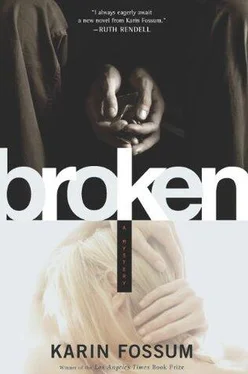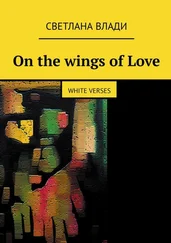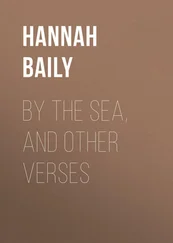I drew up to Shehnaz Saeed’s house, and when the chowkidar opened the gate I drove up the long driveway and parked just near the front door of the double-storeyed, yellowstone house.
There were three steps leading to the carved wood door and potted plants all around the alcove within which it was set — some hanging from the ceiling, some not. Lilies, orchids, spider-plants. I rang the door-bell. An old woman opened the door, looked startled to see me, and then laughed without evident humour and pointed at my eyes. ‘Descended from one of Sikandar’s soldiers, I always used to tell her,’ she said, and turned and walked away, gesturing for me to follow her.
How often had my mother been here between the Poet’s death and her own disappearance? Those were the two years when conversation between us slowed to a trickle. I spent so much — the idiocy! — of those years slamming doors and saying things like ‘It’s none of your business where I’m going.’ That particular sentence came out when something of her old self was awake in her, and she replied, ‘Fine, then I won’t tell you where I go when I go out.’ It was in my hands, she made it clear, to choose to end the foolishness of that reciprocal silence, but I was too proud to do so. And where had that pride got me? Right here, in the doorway of Shehnaz Saeed’s house, knowing nothing.
I looked around. The house was airy in the way that no modern housing ever is, and the ceilings were high. Along the whitewashed walls were portraits of Shehnaz Saeed by both acclaimed and little-known artists. It should have seemed an act of monumental egoism to fill the entrance to your home in such fashion, but as I walked closer to the row of paintings it seemed clear that the display mocked the adulation of beauty. They were so varied, the paintings, in their portrayal of her that what came through ultimately was the absence of any singular truth about her visage and how it is perceived. Next to the painting nearest the door was a mounted card with a single word on it: APPEARANCE.
As I stood by the mounted word, recalibrating my expectation of Shehnaz Saeed to encompass a subtle intelligence, the woman who had opened the door continued to walk down the alternating black-and-white stone tiles of the hallway. With her black chapals and black shalwar-kameez she seemed to appear and disappear as she stepped from light tile to dark, her existence a strobe-light illusion.
She stepped on to a white tile and looked over her shoulder at me. ‘What, do you want a palanquin to carry you?’
I followed her through the hallway, past an open door through which I could hear the ‘hmm… hanh… hanh’ of someone talking on the telephone. The door was artfully ajar to allow passers-by a glimpse of a Gandhara Buddha, a Bukhara rug, and a bare arm draped over a sofa back. ‘It’s my house. I’ll invite who I want!’ the voice said, and it was Shehnaz Saeed’s voice. I wondered if she were talking about me and, if so, whether it was Ed on the other end of the line, but my guide was looking back impatiently as I slowed my steps so I had to speed up and follow her. Then I was climbing up stairs and more stairs, feet echoing on the uncarpeted ground. It was surprisingly cool indoors; the slatted window shutters facing the sun were all closed, casting half the house into shadow.
At the top of the stairs, the old woman pushed open a set of wooden doors and gestured for me to step outside. I did so, and found I was on the roof, diagonally across from a cupola of yellow stone which gave shade to a table, laid for two, beneath it. The old woman disappeared back indoors. For want of something better to do I walked round the roof, looking down on the beautifully tended garden below and enjoying the view this height afforded of grand neighbourhood houses, more than one of which served as diplomatic housing for consul generals from countries which, after the Soviet invasion of Afghanistan, had made it known to the Poet that he need not bother applying to them for asylum. Freedom of speech was all very well, but there was no need to exercise it against a government that was helping in the fight against Communism — that had been the implicit message back in those days when our schoolteachers told us that the Russians thought of Afghanistan as a mere steppingstone to the warm-water port of Karachi, so it was our national duty to… oh, why think of any of that? Any of that or any of what followed or what was still to come.
‘You’ve sowed, now reap,’ I announced to any representative of the nation who might be listening.
I gave myself over to the view again. Karachi looked like a green city from up here, the usual vistas of unrelenting cement and concrete replaced by lushness. I closed my eyes and enjoyed the breeze. November had brought a change in climate and already there was an intimation of winter in the air. Soon, the breeze promised, you will sit outdoors at night wrapped in shawls, breaking open shells of peanuts just off the flame.
I turned the corner, back to the cupola. There was someone sitting there, facing away from me, one arm over the chair back, in the same posture that I had seen through the open door. She was dressed in a sari with a sleeveless blouse, a red rose stuck behind her ear. The theatrics of it!
I walked closer. My chapals slapped against the brick as I approached her, but she showed no signs of being aware of the sound. I wondered if she were a little hard of hearing. And then, for the first time, I realized she must have aged. In 1987, when she retired, she had been thirty-eight. So, fifty-three now. Where stunning women are concerned that change from late thirties to early fifties can sometimes be a matter of exchanging obvious beauty for a more subtle loveliness — the lines of mortality and the pull of gravity can alter an aspect to make it more moving, more precious for its own admission that it will not last. But sometimes, also, those years wipe a face clean of the memory of its own younger self and mark it chiefly with a premonition of the ravages that will befall it.
I stayed back, unwilling to walk straight up to her and have to see, up close, every emerging wrinkle delineated by the afternoon sun.
‘Hello,’ I said.
In a single fluid gesture she uncrossed her legs, turned, and stood. She did it with the sort of easy grace that can only come with practice. She had not exchanged obvious beauty for subtle loveliness. No, hers was still a quite obvious loveliness. She saw me and laughed; crow’s feet around her eyes and the angles of her face no longer seemed quite so sculpted, but for all that she was just as unapproachably lovely as when she had played Lady Macbeth.
‘It’s a stunning resemblance,’ she said in that lilting voice of hers which could deepen into gravity so unexpectedly. ‘All in the eyes, of course. Come here and give your old aunty a hug.’
I did, and was surprised by the fierceness of her embrace. ‘Samina’s daughter. My God, Samina’s daughter all grown up.’
Ed had something of her tempo of speaking. I hadn’t realized that until now.
She released me and pointed to the chair opposite her. While I had taken my twirl around the roof someone had placed na’ans and chicken tikkas and chutneys on the table. I sat down and almost immediately a moist tongue licked my foot. I jerked my feet up, and a chihuahua darted out from under the table.
‘Director, come here!’ The bonsai dog turned to Shehnaz Saeed. ‘Basket!’ she said, and Director skittered towards the door leading back into the house.
‘Did you choose that name as a tribute or an insult?’ I asked. The question launched her into a series of tales about her theatrical days and all the triumphs and tribulations she had faced. She had the extraordinary ability to speak only in short bursts, creating the impression that she was allowing me ample opportunity to be part of the conversation, yet she ended every series of sentences with the artfulness of Scheherazade drawing the night’s story-telling to a close—‘Of course that wasn’t the worst disaster!’ or ‘If only people knew the truth about his eyebrows’ or ‘We called her Peking Duck, for reasons you might be able to guess’—so ultimately my side of the exchange consisted of little more than ‘Why?’ and ‘How?’ and ‘What do you mean?’ The most aggravating part of sitting through her self-obsessed performance of her own past was the adolescent voice inside me squealing, ‘IT’S SHEHNAZ SAEED!’
Читать дальше












